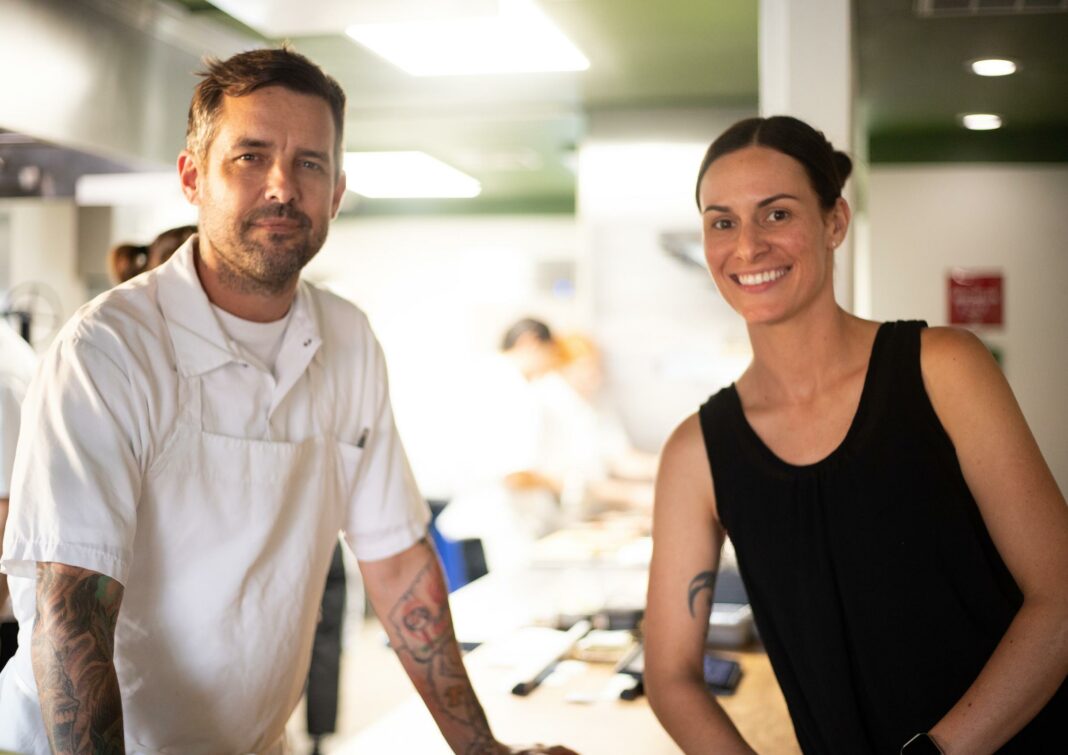Long Beach’s Heritage not only received its first Michelin star in July, but also a Michelin green star for its efforts toward sustainability.
At Heritage, a sustainably-sourced fine dining restaurant in Long Beach, the dynamic, evolving six-course tasting menu routinely rotates based on the season and availability of ingredients at local markets, resulting in innovative flavor combinations.
The summer menu features a grilled diver scallop served on top of Dungeness crab, corn, and farm squash, cooling the sweet spiciness of the seafood and creating a balanced, rich bite. Concluding with a cake derived from the siblings’ grandmother’s recipe, the dish is elevated through combining soft and hard elements with flavor profiles of passionfruit, feuilletine, and mint, providing a complex, yet satisfying finale.
Behind the scenes, the restaurant’s owners, sibling duo Lauren and Philip Pretty, challenge themselves to be as creative with waste as they are with the cuisine.
“How do we use this extra trim that comes from produce, vegetables and even meat—like bones—and incorporate this into our menu, or keep it from going into the trash?” co-owner Lauren says.
This summer, their dedication to excellence in the kitchen and their commitment to green practices paid off in the biggest possible way. Heritage received a Michelin star, becoming the only restaurant in Los Angeles County to be newly added to the prestigious list in 2023. They also collected a Michelin green star, a distinction given to restaurants with trailblazing sustainable practices. Only five other restaurants in the state were granted the green star.
“The Michelin definitely put a spotlight on us,” Lauren says. “Now, we feel a big responsibility to keep that momentum going with being a green business, continuing to improve and do better.”
Heritage opened in 2020 during the pandemic, when the siblings were limited to serving one thing: takeout sandwiches. Lauren was bothered by the amount of waste the restaurant produced while serving strictly to-go. Philip, with 18 years of experience as a chef, knew how much waste could accumulate in fine dining, and he didn’t want to contribute to it.
In the beginning, Lauren says, she did her best to source green products and eliminate waste. But it wasn’t until an intern from the City of Long Beach reached out about the Green Business Program, a free program available to any Long Beach business interested in reducing its environmental impact, that Lauren “went down the rabbit hole” researching green practices.
“It changed my whole outlook on sustainability practices within the business because it wasn’t just about buying brown paper napkins and compostable to-go boxes,” Lauren says.
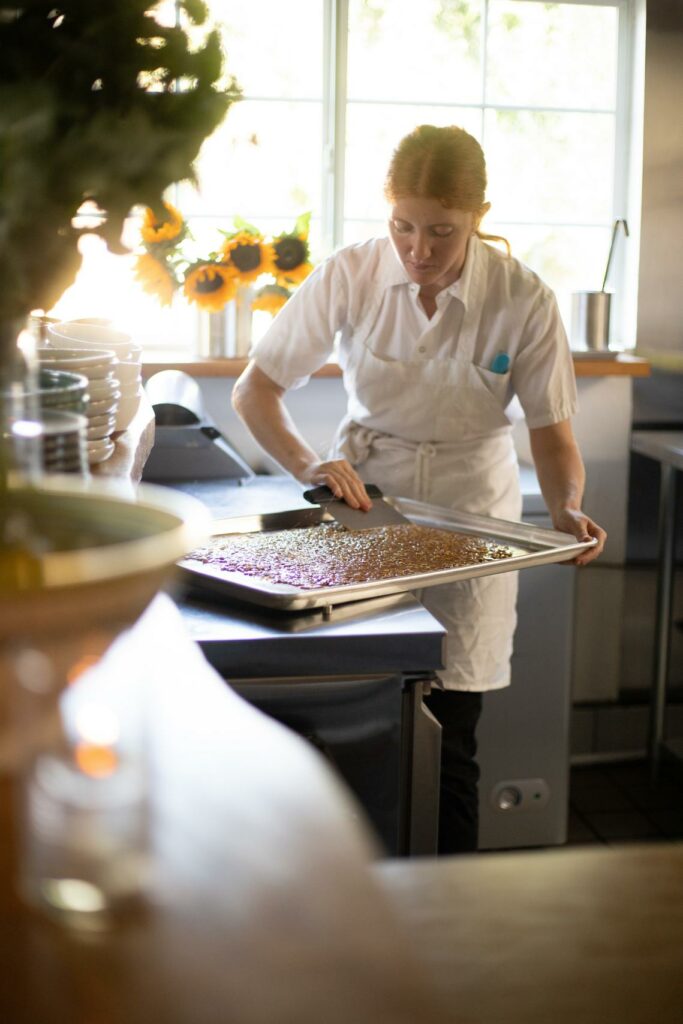
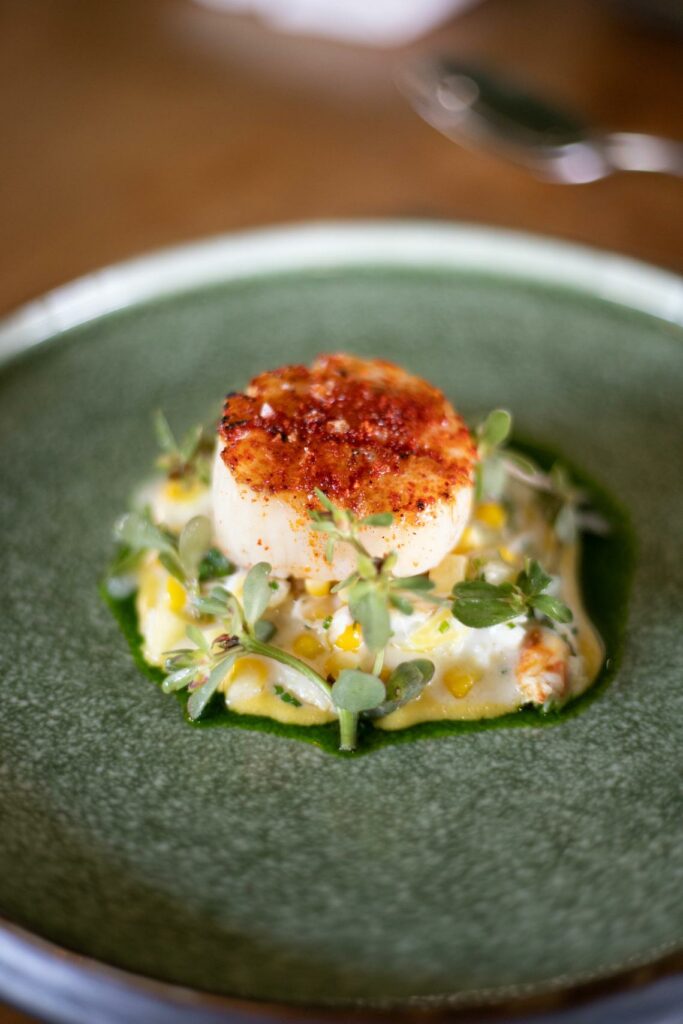
For the Green Business Certification from the city, Heritage was required to complete a checklist of requirements. Some tasks were easy, like switching to recyclable paper, Lauren says, but others initially stumped her, like a requirement banning bleach, which is used to clear drains in kitchens. After much research, Heritage switched to hydrogen peroxide, which Lauren says is just as effective, if not better, and less harmful to the environment.
Heritage received the certification, but it didn’t stop there. In June 2022, Lauren and Philip leased a small plot at a farm about a mile away from the restaurant to establish a garden, and in 2023, took over the lease for the entire farm. Lauren says at the time she felt “a little bit crazy.”
“I [couldn’t] imagine taking on another rent after just having barely made it through the pandemic and surviving as a business,” Lauren says. “But when I walked into the space, it was so beautiful. I had this overwhelming feeling that we needed to just take the jump and try.”
The siblings hired a local farmer to manage the land full-time, which has helped them double the amount of product produced and streamline their business. The front lot is ripe with sprouting herbs and peppers whose colors swirl from red to green. The farm is home to chickens, whose coop borders a back plot that will soon be rowed with beets.
“If you have tops on ingredients, can you saute them? If you have stems, can you pickle them? When we do fish, we use everything across the board—from the bones, to the skin. Any meat we bring in, [there are] zero scraps.”
-Philip Pretty, Heritage co-owner
Growing their own food instills a “sense of pride,” Philip says. The first year of farming was full of trial and error, exploring what to grow and how much. Now, the Prettys are looking to make the best use of the land as they continue to improve their self-sufficiency. The ability to exercise creative freedom across the entire business is something that excites Philip.
“My whole career I’ve been chasing sustainability in one shape or form,” Philip says. “Here, I can do it all across the board.”
Accordingly, Philip actively looks for ways to reduce waste in the kitchen, finding innovative methods for using all parts of an ingredient and creating a culture of sustainability within the restaurant. Any scraps or trim go into a family meal for the staff.
“If you have tops on ingredients, can you saute them?” Philip says. “If you have stems, can you pickle them? When we do fish, we use everything across the board—from the bones, to the skin. Any meat we bring in, [there are] zero scraps.”
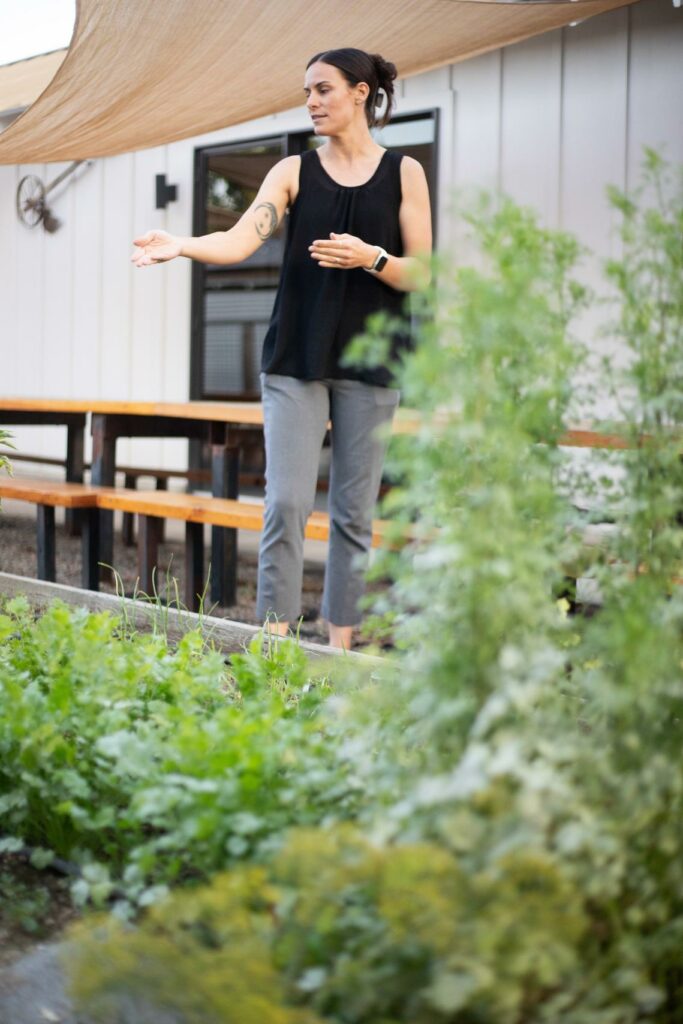
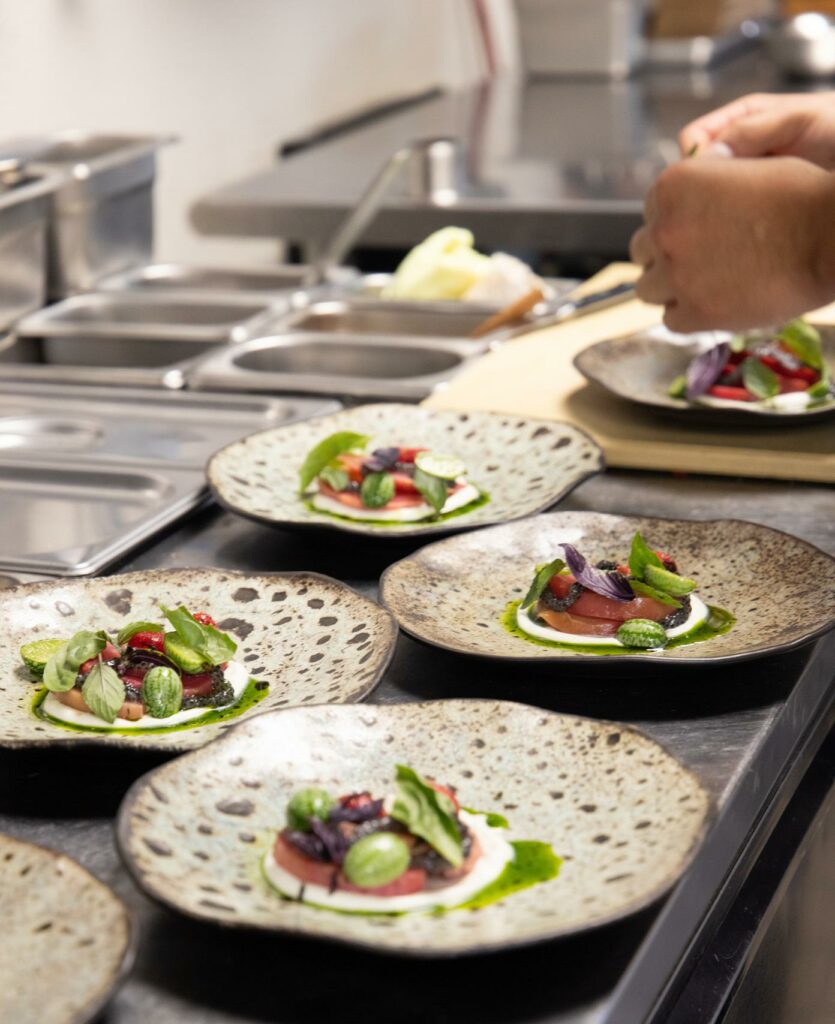
The minimal waste Heritage produces gets composted through the city of Long Beach’s Commercial Food Scraps Collection Pilot Program, which means meticulously separating the trash. Laughing, Lauren says that she often feels like a crazy person constantly monitoring the waste and saying, “This isn’t compostable!”
Regardless of personal opinions on climate change and environmentalism, Lauren explained that being conscious about waste doesn’t have to be a political stance. Both the siblings expressed how being conscious about their waste and impact just makes them feel good.
“At the end of the day, it’s about what makes you feel good and right as a person,” Lauren says. “Do you feel good about throwing away this massive amount of garbage into a landfill? Wouldn’t you feel better if your trash was separated correctly and you knew it was doing something good for the environment?
“When you own a business, you’re creating a carbon footprint. No matter how big your business is…you can still make a difference.”

